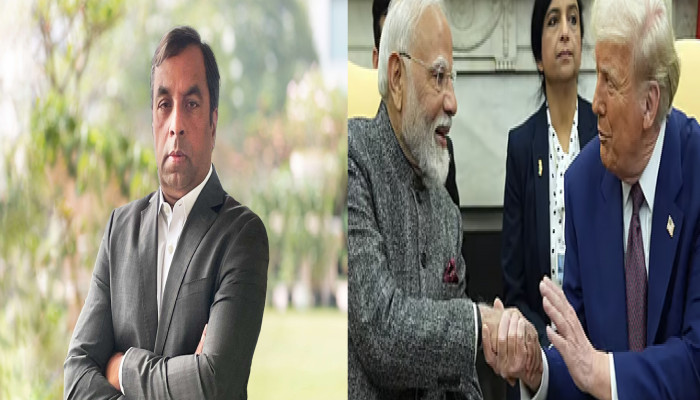India should stop all talks with US, engage like other countries: GTRI
- In Reports
- 04:34 PM, Mar 08, 2025
- Myind Staff
India should stop all trade negotiations with the US for now and instead prepare to deal with the Trump administration the way countries like China and Canada are doing, according to the economic think tank GTRI (Global Trade Research Initiative). Ajay Srivastava, the founder of GTRI, said that the US is putting strong pressure on India to accept trade terms that mostly benefit America.
He said that US President Donald Trump and his officials have mostly criticized India using incorrect data. "Trump is insulting India publicly using wrong data. No balanced outcome is possible in such circumstances. India should withdraw from all negotiations and prepare to deal with them like other countries are doing," Srivastava said. China and Canada have declared retaliatory actions in response to US tariffs. Trump said his administration "exposed" unfair trade practices, and as a result, India agreed to lower tariffs on U.S. goods on Friday. "This is patently incorrect and intended to pressurise India. India's silence is baffling and India needs to counter with facts. Whole world is watching as Trump and his officials belittle India every day," Srivastava added.
Howard Lutnick, the US Commerce Secretary, has also stated that India must expand its agricultural sector, stressing that it cannot be "off the table" during negotiations with its biggest trading partner. Instead of promoting bilateral trade through "product-by-product" agreements, he has advocated for a macro, vast, and grand trade agreement with India.
According to a GTRI report, a detailed trade agreement would allow the US to push for its demands, not only for lower tariffs but also on issues like government procurement, agricultural subsidies, patent laws, and unrestricted data flow—areas that India has consistently opposed. "Second, Trump's history of disregarding negotiated trade agreements is evident from his decision to scrap the US-Mexico-Canada FTA, which he himself finalized in 2019, and his imposition of 25 per cent tariffs on Canadian and Mexican imports now," it said.
Under the "Zero-for-Zero" strategy, which calls for India to remove tariffs only if the US does the same, it recommended that India look into a macro-level reciprocal tariff system that covers more than 90% of industrial goods. It added that since the automobile industry accounts for one-third of manufacturing GDP, India must avoid making the same error. "However, agriculture, passenger cars, and other sensitive sectors must remain excluded," it stated. It cited an example of Australia's domestic car industry, which collapsed after the country reduced car import tariffs from 45% to 5% in the late 1980s. Regarding India's car exports, it mentioned that India exported less than $13 million worth of passenger cars to the US. If America increases tariffs on Indian cars, it will have no significant impact on India.
While discussing the opening of the agriculture sector, Srivastava, who previously worked in the commerce department, strongly opposed the idea. He emphasised that India's agriculture sector supports over 700 million people, while in the US, it supports less than 7 million. This makes it a matter of livelihood rather than just a trade issue. "Opening even a few agricultural products to US imports could set a dangerous precedent, leading to increased pressure for further concessions," he said, highlighting that tariffs on top US agricultural exports to India are already low. The import tariff on almonds is ₹35 per kg, which is just 5% of the current import price of ₹700 per kg. Pistachios have a 10% import tariff, while ethyl alcohol is taxed at only 5%. "With India's total agriculture, dairy, and marine exports to the US amounting to just $5 billion, retaliatory US tariffs would not significantly harm India. If India concedes today, more products will be added to the US list in the future," he warned.
Regarding the US's claim that India is a "tariff king," he pointed out that while India does have high tariffs on certain items—such as 150% on wines and alcohol and 100% on cars—the US itself imposes a 350% tariff on tobacco. He explained that the tariff rates on US goods entering India are only 4.9% higher than the tariffs the US imposes on Indian products. Additionally, he pointed out that US officials often present trade figures inaccurately. For instance, Trump stated that the US trade deficit with India is $100 billion, while India's official data shows it to be less than $45 billion. "Similarly, the White House fact sheet inaccurately stated that India imposes a 100 per cent tariff on Harley-Davidson motorcycles, when the actual tariff was reduced from 50 per cent to 30 per cent on February 1. It is painful, despite repeated provocations from the US, the Indian Government or any industry association has not countered such misinformation," said Srivastava.
He mentioned that as many countries are pushing back against Trump's trade policies, India should also take a stand. Instead of short-term compromises, India should focus on strengthening its economy for the long run. If the US refuses the 'Zero-for-Zero' offer and enforces reciprocal tariffs, India should only respond if absolutely necessary. Trade data indicates that well-calculated reciprocal tariffs will not significantly impact most industries.







Comments